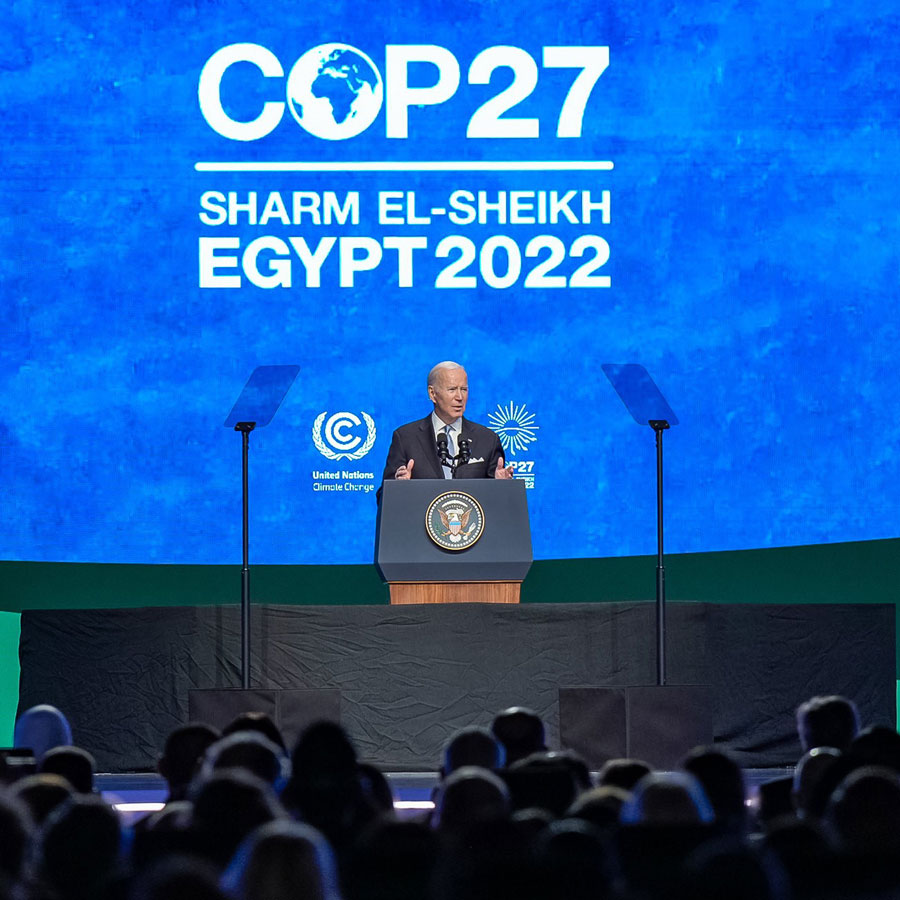 The list of participants at COP27 is fascinating – which isn’t an adjective one usually associates with a document that is 1 739 pages long and is essentially a long list of names and job titles.
The list of participants at COP27 is fascinating – which isn’t an adjective one usually associates with a document that is 1 739 pages long and is essentially a long list of names and job titles.
The list contains some peculiarities. The largest national delegation at the Sharm El-Sheikh talks – with over 1 070 people – was the United Arab Emirates (the host of next year’s climate change conference) and included representatives from leading consulting and public relations firms including Boston Consulting Group, Burson Cohn & Wolfe, Edelman, Havas and McKinsey. Of the 136 delegates from Tunisia, 64 were simply listed as ‘experts’, with little indication of whether their expertise was being used to represent the interests of the Tunisian government, NGOs or the private sector.
Both the current British Prime Minister, Rishi Sunak, and his predecessor, Liz Truss, were listed as UK attendees. The CEO of the energy multinational BP was registered as part of the official government delegation of Mauritania; the CEO of the public relations company Freuds was registered as part of the official government delegation of Papua New Guinea; while a BBC News presenter was included in the delegation from Tonga. The headcount from national delegations included over ninety official photographers and camera operators, 25 embassy drivers, and dozens of interpreters.
But beyond these anecdotal oddities, the COP27 participant list is also a highly revealing snapshot of power, access and influence. As the 2022 conference was deemed ‘the food systems COP’ where food and agriculture issues were supposed to take centre stage, it’s particularly important to scrutinise which organisations and individuals in the food system had access to the talks, and presumably sought a level of influence in the negotiations. Following on similar analysis we conducted during COP26, we have studied the entire list of participants to highlight which food-related sectors and groups were involved at COP27.
An important presence from meat and dairy industries
- Like last year, Brazil provides a particularly revealing case study of cooperation (or possible co-optation) of government and business interests. The official Brazilian delegation included the corporate responsibility director and the executive manager of the meat processing firm JBS, but the delegates – Mauricio Jose dos Santo Bauer and Márcio Soares Rodrigues – were officially listed as representatives from the Ministry of Agriculture, Livestock and Supply. In addition, a separate group – the JBS Fund for the Amazon – was able to send four delegates to the conference.
- Senior employees of Marfrig, Brazil’s second largest food processing company, also attended COP27 as part of the Brazilian delegation, but seemingly without declaring their commercial roles. Marfrig’s chairman, Marcos Antonio Molina dos Santos, and a member of the company’s board of directors, Marcia A.P. Marçal dos Santos, were also formally listed as members of the Ministry of Agriculture, Livestock and Supply.
- Brazilian beef producing interests were also apparent via the presence of five representatives (listed as president, executive director, technical director, special advisor and sustainability advisor) of the MatoGrossense Meat Institute, whose mission is to promote beef from the region of Mato Grosso. In addition, the sustainability coordinator of ABIEC (Associação Brasileira das Indústrias Exportadoras de Carnes or the Brazilian Beef Exporters Association) was also a member of the official Brazilian government delegation.
- Israel’s national delegation included two representatives from the International Dairy Federation. The International Dairy Federation was also independently represented by its director general, Caroline Emond, and its president Piercristiano Brazzale, the CEO of Brazzale S.p.A., Italy’s oldest dairy company.
- Canada’s national delegation included a representative of the Canadian Cattle Association. (The governmental delegation also included the chief executive of Protein Industries Canada; the chief executive and the chief product officer of Lucent BioSciences, an agricultural biotech company; and the president, the director and the public relations coordinator from the Union of Agricultural Producers of Quebec).
- Russia’s national delegation included a representative from the Russian National Dairy Producers Union.
- An employee of FrieslandCampina, a Dutch dairy multinational, participated as a representative of the European Dairy Federation.
- Six people participated as members of the Global Dairy Platform. They included Jay Waldvogel, the vice-president of Dairy Farmers of America; Margrethe Jonkman, the global director of research at FrieslandCampina; and Hanne Søndergaard, the vice-president of Arla Foods.
- In addition, the trade association Beef + Lamb New Zealand sent two delegates, the Global Roundtable for Sustainable Beef sent five delegates, and the International Meat Secretariat (registered as Office International de la Viande) sent three delegates.
Who else took part from the private sector?
One-third of all attendees (11 711 out of a total of 33 449 participants) were purportedly taking part in COP27 as part of ‘non-governmental organisations’, which, as we highlighted in last year’s analysis of COP26, is a catchall term that can include trade associations and business groups, as well as industry-led non-profit organisations.
Attendance via cross cutting business federations
- The Brazilian Business Council for Sustainable Development included two representatives from the German agrochemical firm Bayer, and a representative of the food processing firm Brasil Foods.
- The Federation of German Industries’ eleven-person team included an employee of BASF and an employee of Bayer.
- The lobby group BusinessEurope and the European Union Chamber of Commerce in China included three Bayer The Chinese business group C Team included the chief sustainability officer from the agrochemical maker Syngenta.
- The International Chamber of Commerce had a 185-person strong presence at COP27, including two employees from Nestlé, three employees from Bayer, two members of the corporate affairs department of PepsiCo, two employees of Unilever, an employee of Walmart, and the executive director of the Syngenta Foundation for Sustainable Agriculture.
- The International Organization of Employers included the sustainability director of the food and agriculture conglomerate Cargill.
Attendance via dedicated trade associations
- The Corn Refiners Association included a vice president from Cargill, the director of trade policy from the American Feed Industry Association, and the senior vice president of communications from the US Dairy Export Council.
- CropLife International, the global trade association of agrochemical manufacturers, sent ten delegates to COP27, including senior representatives of BASF, Bayer, Corteva Agriscience and Syngenta.
- The International Fertilizer Association registered nine delegates at COP27, including two vice-presidents of the Norwegian fertiliser manufacturer Yara, a vice-president of the Canadian fertiliser manufacturer Nutrien, as well as the global public affairs director of the wine and spirits giant Moët Hennessy.
Attendance via industry led non-profit groups
- The Business Council for Sustainable Energy’s 22-strong delegation included two senior employees of the confectionary multinational Mars.
- COP27 attendees from the International Emissions Trading Association included representatives from global commodity traders Mercuria and Trafigura, an employee of Bayer, and two employees of Yara and Nutrien.
- The World Business Council for Sustainable Development’s delegation included the chief sustainability officer from AB InBev, the world’s largest brewing company; as well as the heads of sustainability from the commodity traders Archer Daniels Midland, Cargill and Louis Dreyfus. The WBCSD delegation also included the director of East African public affairs for Bayer, a vice-president of the Dutch nutrition and ingredients company DSM, and the head of Latin American business and sustainability at Syngenta.
Attendance of farming interests
Given the importance of food and agriculture at COP27 (it was the first time that a COP had a dedicated pavilion highlighting the links between food systems and climate change), the presence of organisations representing farming interests was also notable.
There was a particularly strong presence from Canadian farming groups. In addition to three representatives from the Union of Agricultural Producers of Quebec on the Canadian national delegation, the National Farmers Union of Canada registered six delegates, while both the Canadian Cattle Association and the Canadian Federation of Agriculture were both able to register three delegates each.
The World Farmers’ Organisation had a 76-person delegation at the COP talks, which included representatives of farming groups from Australia, Denmark, France, Ghana, India, Ireland, Italy, Kenya, Malawi, Rwanda, Sweden, Uganda, the United States and Zimbabwe.
Food systems actors from civil society
This is not to say that food systems were only represented at COP27 by the private sector. A variety of civil society food systems actors took part at the climate change conference, as part of national delegations, non-governmental organisations or intergovernmental organisations.
- The Executive Director of the Global Alliance for Improved Nutrition, Lawrence Haddad, was registered to participate at COP27 as a member of the national delegation of Bangladesh.
- The Good Food Institute – which promotes plant- and cell-based alternatives to meat, dairy, and eggs – registered 15 attendees, a larger number of people than the individual government delegations of Albania, Guyana or Kyrgyzstan.
- Nine people representing EIT Food, an EU-funded ‘food innovation community’, were registered to attend COP27 as part of Bournemouth University.
- WWF’s official delegation totalled 91 attendees. Members of WWF were also included in national groups, with WWF representatives registered on the government delegations of Austria, Finland, Kenya, Namibia, the Philippines, Tanzania and the United Arab Emirates.
- Oxfam similarly had members included in the national delegations of Burkina Faso, Kenya, Timor-Leste and Uganda, in addition to its 19-person standalone delegation.
- The International Institute for Environment and Development sent ten members as part of its official delegation. In addition, IIED members were included in the government delegations of Burkina Faso, Ethiopia, The Gambia, Senegal, Sudan and Uganda. The Alliance for Food Sovereignty in Africa had five members on its delegation, as well as two representatives on the government delegation of Uganda.
- The campaign group Compassion in World Farming had seven representatives at COP27, while the International Panel of Experts on Sustainable Food Systems sent five representatives.
- CGIAR had a 25-person delegation, and also sent representatives to attend the talks as part of the International Potato Center and the International Plant Genetic Resources Institute.
- 17 people attended COP27 as members of the Inter-American Institute for Cooperation on Agriculture(registered as Instituto Interamericano de Cooperación para la Agricultura).
- The International Livestock Research Institute had nine registered delegates; the International Rice Research Institute had five registered delegates; and The Crop Trust, officially known as the Global Crop Diversity Trust, had four registered delegates.
It is certainly encouraging to see more food-centric civil society groups getting actively involved in the COP process. However, many readers will be deeply concerned to note that some industry groups had more delegates at COP27 than individual countries, and that some companies – particularly meat and dairy producers, which continue to generate significant amounts of greenhouse gas emissions – might have been able to participate directly in official climate negotiations because they are accredited to government delegations.
Last year, we stated that there was a need for more transparency when it comes to allocating space to businesses at United Nations events like the annual climate change conference. In addition to issues of access and power, our findings this year once again raise questions about the number of non-state participants that take part at COP meetings and the extent to which they are (or are not) involved in negotiations, as well as questions of effectiveness and fair representation in the UN’s current accreditation and registration process.

